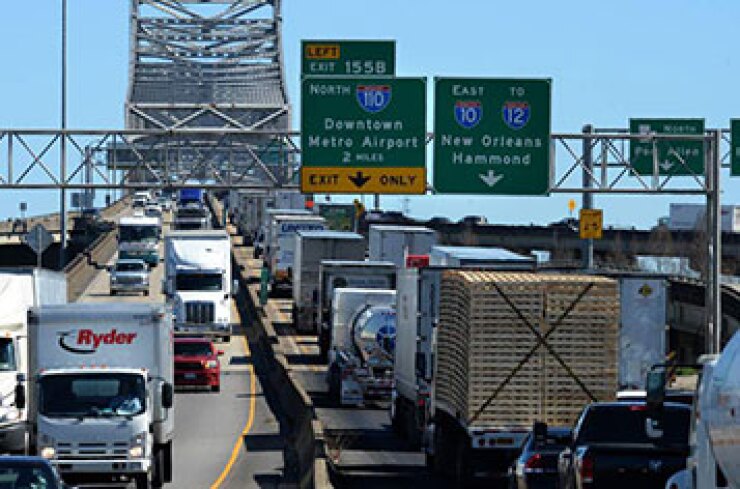
DALLAS -- Louisiana may finance upgrades to a congested interstate highway in Baton Rouge with the state's first transportation public-private partnership.
The Louisiana Department of Transportation and Development on Monday issued a request for information to potential investors in the $600 million project to widen a seven-mile portion of Interstate 10 through Baton Rouge and build a number of interchanges.
"This is a first step in positioning the state to leverage private sector resources in delivering major enhancements to the I-10 Capital Corridor," said Gov. John Bel Edwards.
A law adopted by the Louisiana Legislature last year authorized the DOTD to solicit proposals for transportation infrastructure P3s and enter into contracts with private partners. The request for information for the I-10 project is the first application of the new law.
Responses from private investors are due by March 31.
The state would not be able to enter into a contract with private investors for the work on I-10 unless lawmakers provide more transportation funding in the legislative session that begins April 10, Edwards said.
"We aren't likely to have the revenue needed to make a P3 work for the entire corridor today, but we will be ready to advance such a partnership if the legislature acts in a meaningful way to fund transportation during the upcoming regular session," he said. "That is my commitment to the people of Louisiana."
Louisiana hopes to build on the successes that other states have had with P3s while avoiding their pitfalls, said DOTD Secretary Shawn Wilson.
"Private investors have their eyes on Louisiana and are eager to invest here," Wilson said. "If we have the funding, I am confident that P3s can work in Louisiana. When handled responsibly, the benefit of these agreements is that more projects can be delivered sooner."
Louisiana has not determined whether a P3 agreement should involve tolls or availability payments from the state to provide the return on investments for the private partner, Wilson said.
The responses from potential investors will guide that decision, he said.
"These public-private partnerships cannot happen with the revenue I have today," Wilson said. "We're asking a public-private partner to bring financing to the table to bring efficiency in delivering the project to the table but more importantly, tell us what we need to pay you back in the long run."
The state is currently facing a $13 billion backlog in transportation projects and has a $16 billion wish list of large projects, according to a report developed by a task force on state transportation financing that Edwards created.
In its final report released in early January, the study group said Louisiana needed at least an additional $700 million per year of sustainable, recurring transportation revenues to restore its deteriorating roads and bridges.
"The transportation plan moving forward must be bold and aggressive as the problem is large and acute," according to the 56-page study. "Nibbling around the edges with an incremental increase in infrastructure investment will not fix the problem and will erode public trust."
The DOTD's current expenditures of $100 million per year for bridge projects means it will take 327 years to replace spans that exceed their 50-year service life, the task force said.
The report recommended an increase in the state's gasoline tax and increased use of P3s and tolling to resolve the revenue gap.
Louisiana's gasoline tax of 20 cents per gallon, which includes 4 cents dedicated to large statewide projects, has not been increased since 1990, the task force noted.
The 16 cents of gasoline tax devoted to highway projects is now worth 7 cents due to inflation, the report said.





